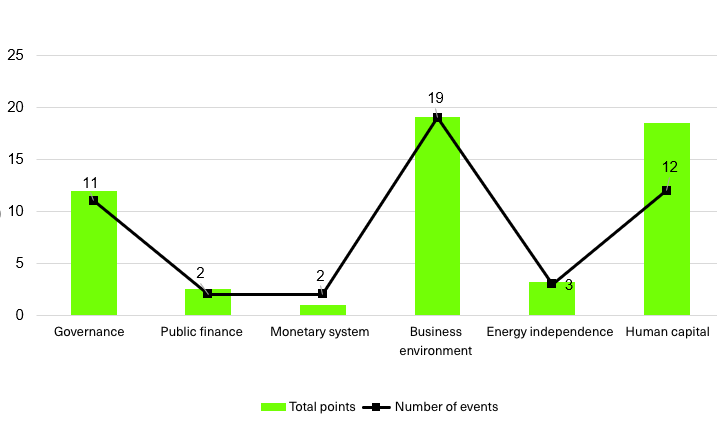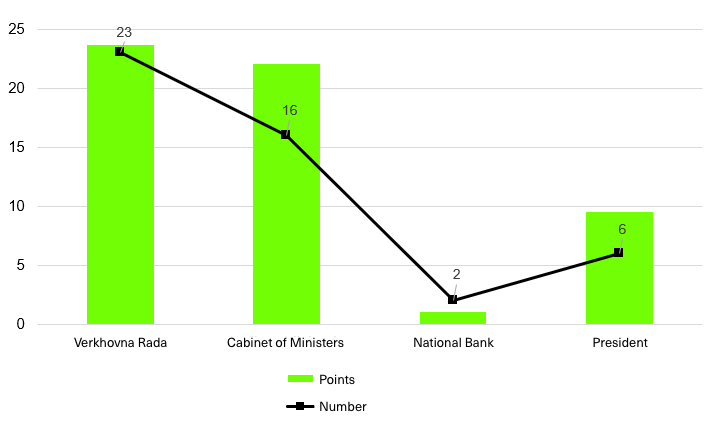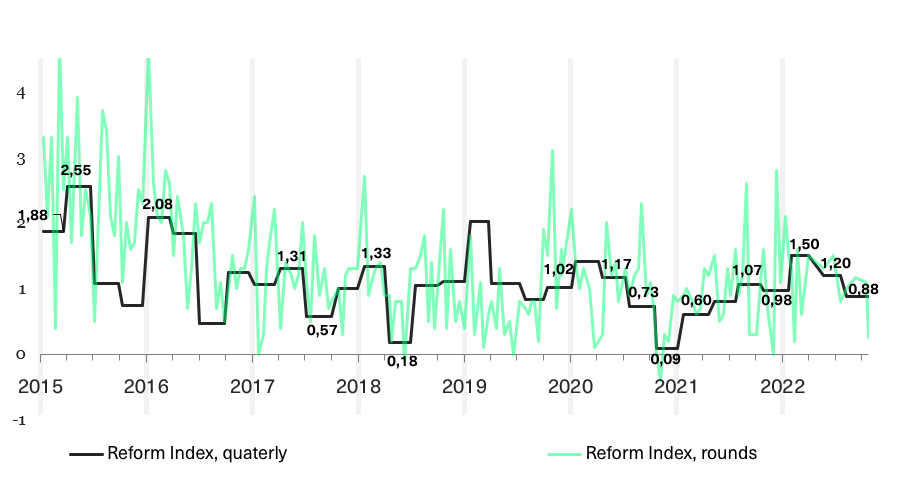After becoming a candidate for EU membership in June, Ukraine has sped up reforms and efforts to come closer to the European Union since July. Over three months, Ukraine ratified the Istanbul Convention, got a “visa-free” transport and customs regime, and harmonized several Ukrainian laws with European regulations. During this period, Ukrainian authorities adopted nearly fifty essential changes in the environmental and economic spheres, including two anti-reforms (tax and customs benefits for industrial parks). Such “generosity” is currently not to the country’s advantage as it does not guarantee economic growth in the future and already reduces tax revenues to the budget.
Key reforms
Two decisions included in the quarterly overview of reforms scored above +2 points (in the range of -5 to +5), which experts believe separates significant reforms from less important ones.
Ratifying the Istanbul Convention (+3 points, Reform Index No.185) became a significant symbol of moving towards meeting European approaches to protecting human rights. Ratifying countries undertake to criminalize gender-based violence and collect statistics on such violence to monitor trends and threats in this area. Such crimes include, among other things, forced marriages, forced sterilization, obsessive stalking of the “object of passion,” and similar acts.
Ukraine has been working towards ratifying the Convention for over 11 years since its signing in May 2011. The All-Ukrainian Council of Churches would oppose it, citing the threat of the term “gender” as a key argument against making it a political and legal instrument “to propagate same-sex relationships… in Ukrainian schools and universities.”
The full-scale war with Russia showed the need for faster rapprochement with the EU and helped the authorities “separate the wheat from the chaff” in the field of human rights protection.
The second decision that managed to conquer the “height barrier” of +2 points was the “visa-free“ transport agreement with the EU (“Agreement between the European Union and Ukraine on the carriage of freight by road“) (+2.5 points, Reform Index No.185). As air and sea links with Ukraine were made unavailable by Russia’s full-scale invasion, the role of road transport increased, and bureaucratic obstacles and delays at customs began to cost even more. After the signing of the agreement, Ukrainian carriers no longer need to obtain additional permits for bilateral and transit transportation through EU countries. Another positive consequence of the reform is that Ukraine and the EU will mutually recognize driver’s licenses issued by one of the parties, so Ukrainians no longer need an international driver’s license to drive a car in the EU.
Anti-reform regulations
In the third quarter, two laws received experts‘ negative assessments. Both had to do with attempts to support questionable “growth points” instead of creating a level playing field for all businesses in the country.
These are the laws on tax (-1.3 points, Reform Index No.185) and customs benefits (-2 points, Reform Index No.185), creating favorable conditions for industrial parks. The laws provide exemptions from paying income tax for ten years if a company has the status of industrial park (IP) participant for at least ten years and exemptions from paying VAT if imported equipment is used in the industrial park. However, there are the nuances:
- if a business entity does not spend the funds saved on the income tax on developing the enterprise within the industrial park in the next year, it will lose the right to this benefit, pay the unused part of the amount as income tax and a penalty for late tax payments;
- if a business entity loses its IP participant status less than five years after importing the equipment, it must pay VAT for the equipment and a penalty for late payment.
Given the uncertainty in Ukraine, these conditions may significantly reduce the offer’s attractiveness for businesses. Another problem is the idea of reducing revenues to the budget at a time when the state critically needs them. Business surveys generally suggest entrepreneurs are likely to cite mistrust of the judicial system, corruption, and the significant influence of oligarchs and monopolies among the critical obstacles to investing in Ukraine, not the tax burden. Therefore, to grow the economy, it is more logical to tackle these issues and not “play” with tax rates.
What are the changes in key areas?
The Reform Index tracks regulatory changes in six areas: governance, public finance, monetary system, business environment, energy, and human capital. In the third quarter, each of them showed progress.
The “Business environment,” “Human capital,” and” Governance” categories made the most progress in implementing reform judging by the total points. Next, let us look at key decisions that put them on top of the table.
Graph 1. Total points by area in the 3rd quarter of 2022
Source: Reform Index’s issues No.185-188.
Note: With the total number of reforms for the period being 47, the number of events in this graph is 49. Two regulations (the law on accelerating privatization to facilitate the relocation of enterprises and the law on mandatory bomb shelters in new buildings and registers of buildings and addresses) fell into both “Business Environment” and “Governance.”
Business environment
In the third quarter, the government adopted 19 significant reforms regarding the business environment. Most of them were initiated by MPs (10), five more by the Cabinet of Ministers, and three by the President.
In addition to the “visa-free” transport regime, we spotted several other essential changes in this area.
European integration in customs and trade. The Verkhovna Rada voted for three laws enabling Ukraine to get a “visa-free” customs regime (the country’s accession to the Convention on the Simplification of Formalities in Trade in Goods, the Common Transit Convention, and the law amending the Customs Code) to coordinate customs issues and develop a bilateral trade environment. They all received +2 points and were included in the 187th issue of the Reform Index. By adopting them, Ukrainian customs can exchange information with other countries in real-time using the New Computerized Transit System (NCTS). One transit declaration (for export, import, and transit) and one guarantee will be enough to move goods between the signatory countries.
Harmonizing environmental legislation with European laws. The law on waste management (+2 points, Reform Index No.185) creates a waste hierarchy similar to that in Europe: waste prevention, waste reuse, recycling (processing for reuse), recovery (energy production), and waste disposal. The law also establishes the “polluter pays” principle to encourage manufacturers to produce more environmentally friendly products. In addition, Ukraine ratified amendments to the Convention on Environmental Impact Assessment in a Transboundary Context (+1 point, Reform Index No.186), requiring that neighboring states be notified of projects that can impact their environment (e.g., building a TPP or an offshore gas pipeline). These amendments regulate the accession of UN member states to the Convention and expand the list of activities that must be reported to neighbors. Also, in the new law, the authorities specified the requirements for obtaining permits for emissions of pollutants into the atmosphere (+1 point, Reform Index No.186) and the grounds for refusing or canceling permits.
Construction. The Cabinet of Ministers adopted a resolution to simplify permit and registration procedures for building, overhauling, and renovating buildings (+1.8 points, Reform Index No.185) to speed up Ukraine’s reconstruction. According to the resolution, construction can take place without a construction passport for structures of up to two floors high, provided that the land’s intended purpose is observed and the plans for developing the land plot are uploaded into the Unified State Electronic System in the Field of Construction (USESFC). Another resolution on changes in the procedure for administering the USESFC (+1.3 points, Reform Index No.187) made it possible to electronically submit programs to comprehensively restore the territory of communities and regions. It also allows one to inquire and receive a response regarding the possibility of installing evacuated enterprises or residential facilities for internally displaced persons in particular locations. MPs also finally defined the mechanism for registering ownership rights to housing during building process (+0.5 points, Reform Index No.187), the specifics of mortgages, and corresponding transactions. All future apartments in buildings under construction must now be registered with the Ministry of Justice in Register of property rights as a separate object of property rights. The developer will only have the right to sell them if they have all the necessary permits. The law on ensuring civil protection during the development of territories (+1.3 points, Reform Index No.187) introduces mandatory shelters in buildings housing 50 people permanently or over 100 people periodically. The law also initiated the creation of two new registers (the Unified State Register of Addresses and the Register of Buildings and Structures). The registers will be used to distribute subsidies, control the work of communal service providers, and later be used when conducting the census in Ukraine.
Human capital
Over three months, we spotted 12 crucial changes in this area. Seven were initiated by the Verkhovna Rada, three by the Cabinet of Ministers, and two more by the President.
The authorities did a good job on the relevant labor market regulations in the summer, passing the so-called freelance law (+2 points, Reform Index No.186) to regulate work with no fixed term of employment but with a fixed amount of tasks. The law protects freelancers’ rights, establishing their right to be employed by several employers simultaneously. It also requires employers to pay a “subscription fee” that cannot be less than the amount paid for 32 hours of work of a similar specialist working fixed hours to freelancers with whom they signed an agreement, even if the latter did not work in a particular month. But the law is nuanced: companies with up to 250 employees can hire freelancers, but those must not exceed 10% of their permanent staff. Two more regulations in this area are designed to regulate the military personnel issue. Over six months into the war, many enterprises could not continue paying salaries to employees who joined the military. The new law (+1 point, Reform Index No.185) canceled the need for keeping the average pay for absent service members (while keeping them employed) and specified that in case of delays with paying wages, the employer is obliged to pay them no longer than six months. The list of reasons for terminating employment was also supplemented. It includes the impossibility of ensuring working conditions for employees due to the destruction of a company’s property because of hostilities, the absence of employees or any information about their absence of over four months, and the death of individual entrepreneurs hiring labor or their being declared missing. Lawmakers also addressed readjusting service members after their return from the war. According to the law on the transition system from military to civilian life (+1.5 points, Reform Index No.186), war veterans and deceased veterans’ family members have the right to social and professional adaptation. The Interdepartmental Working Group is currently working on it.
Culture. To counter Russia’s influence on the cultural front, the authorities passed a law supporting the national music product and limiting the public use of the music products of the aggressor state (+1.5 points, Reform Index No.185). The law introduced a ban on tours by aggressor state citizens and on publicly played videos and music recorded by singers who are citizens of a country recognized as an aggressor state (no matter when). At the same time, it is planned to create a list of performers condemning the aggression against Ukraine to whom the new restrictions do not apply.
The law also increases the share of Ukrainian in broadcasts. The latter should air at least 50% of Ukrainian content on television, at least 75% of the broadcast time on the radio, and at least 40% of the music in Ukrainian. “Acoustic violence” in public transport is another issue the law addresses. Drivers of regular passenger buses and minibusses are prohibited from “playing music, movie sounds, or other sound signals in the bus cabin, except for information about the trip.” Doing so is only possible using headphones. The same prohibition applies to passengers. Violators listening to music through speakers may even be disembarked from the vehicle.
Governance
In this area of monitoring, we spotted eleven essential changes. Five reforms were initiated by the Verkhovna Rada and the Cabinet of Ministers, and one more by the President.
State property. To find private owners for state-owned enterprises more quickly and increase budget revenues, the authorities adopted the law on privatization (+1 point, Reform Index No.187). This law allows it to form pools from several privatization facilities and sell properties without conducting audits, inventory, and valuation. Another plus is reissuing permits and licenses for some types of activity for the buyers before expiration, which will significantly speed up putting privatized enterprises into operation. During martial law, large-scale privatization (entities worth more than UAH 250 million) is prohibited, as is the privatization of properties located in or near the war zone. The state also decided to hand over water supply and sewerage enterprises free of charge to communities (+0.5 points, Reform Index No.187) if they are ready to use them as intended and not alienate them to turn into private property.
Digitization. In the third quarter, Ukraine continued to move towards a “digital state.” The authorities decided to expand the services obtained via the Diia app. The Cabinet of Ministers developed a universal algorithm for providing such services (+2 points, Reform Index No. 186) to reduce the human factor and opportunities for corruption in the citizens’ interaction with the state. To speed up bureaucratic procedures for Ukrainians abroad, the government identified 57 countries with which it is possible to exchange documents containing citizens’ personal information (+0.5 points, Reform Index 187).
To ensure data protection on the websites of state bodies and in the registers of the owners of state information resources, it is allowed (+2 points, Reform Index No.185) to conclude technical administration agreements with foreign cloud service providers. The owners are also obliged to create backup copies of data on physical media to ensure their safe storage (e.g., in embassies of Ukraine in other countries).
The icing on the cake of reforms in this area was the new law on official statistics (+2 points, Reform Index No.187) based on the EU’s regulatory framework. It gives the State Statistics Service the right to receive administrative data on Ukrainians and legal entities from other bodies, significantly reducing the reporting burden on respondents. The law also creates prerequisites for developing statistics bodies’ information systems and their integration with the information systems of other authorities. In addition, the law regulates the issue of accessing microdata for research purposes, which has long been the focus of Ukrainian scientists and researchers.
Who are the biggest reformers?
In the third quarter of 2022, the Verkhovna Rada led the way by adopting 23 reform regulations, followed by the Cabinet of Ministers, which initiated and adopted 16 laws and resolutions. The President initiated six reforms, and the NBU adopted two important resolutions.
Chart 2. Initiators of the reforms in the 3rd quarter of 2022
Source: Reform Index’s issues No.185-188.
Compared to the previous quarter, in the third quarter of 2022:
- important regulations’ numbers increased by a third, from 33 to 47;
- the average round score fell from 1.2 to 0.9 points;
- the average event score remained unchanged (+1.2 points in the range from -5 to +5).
Chart 3. Reform Index’s quarterly average
Note: the round and average quarterly scores up to the second quarter (included) were recalculated based on the 2022 audit results.
Ukraine confidently demonstrated a desire to harmonize its legislation with European laws in the third quarter, which is a necessary but insufficient step for further European integration. After all, the judicial system, which has already become the talk of the town for Ukrainian society and European diplomats, remains unreformed.
This publication was produced within the framework of the “Support of think tanks” project which is carried out by the International Renaissance Foundation with the financial support of the Embassy of Sweden in Ukraine. Its contents are the sole responsibility of the authors and do not necessarily reflect the views of the Embassy of Sweden in Ukraine and the International Renaissance Foundation.
Attention
The author doesn`t work for, consult to, own shares in or receive funding from any company or organization that would benefit from this article, and have no relevant affiliations







